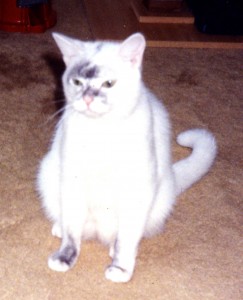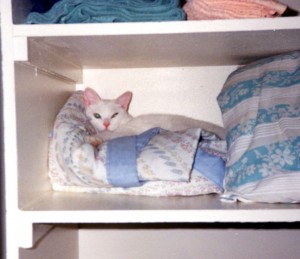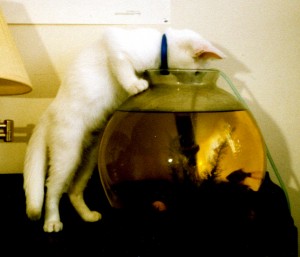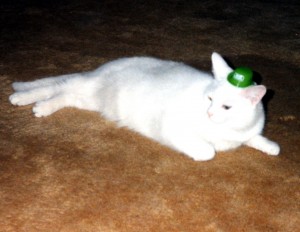In the first day in our new house, the movers had just finished dropping off our stuff, and we’d finished the pizza we ordered for dinner. We hadn’t unpacked any trash cans yet, so I figured I’d take the pizza box all the way to the cans in the alley. It never occurred to me that I wouldn’t make it.
It was already dark, and the 100-year-old house was new and unfamiliar, so I wasn’t sure where the light switches were. I found a switch inside the enclosed porch, but nothing happened, so I opened the back door and leaned out to see if there was a switch outside, or a bulb. There was a fixture, and I took a step off the porch to get a better look.
A step … into the air. I had managed to miss the steps entirely, which weren’t quite where I expected them to be, and also managed to catch one of my shoes on the porch. This propelled me face-first onto the concrete about six feet below, where I caught myself with both hands. My arms gave way, and I crumpled in a heap.
Sure, it hurt, and yes, my arms wouldn’t move, but I didn’t realize they were actually broken until the next morning, when it was perfectly clear that my arms still refused to move when told to do so.
Since we had just moved in, neither one of us had any idea where the closest hospital was, so my wife called the man I worked for, who lived nearby. We’ll call him Dave.
Wife: “Do you know where the closest hospital is?”
Dave: “What happened?”
Wife: “I think his arms are broken”
Dave: “Never mind that, is he going to be at work tomorrow?”
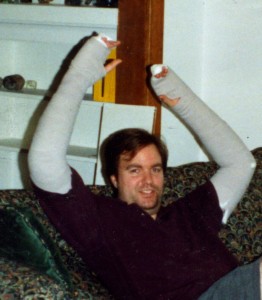
Broken Elbows
The closest hospital is called Resurrection, which, unfortunately, is less a bold statement about their medical abilities and more an indication that it’s run by Catholic nuns. I couldn’t hold a pen, so my wife took care of most of the paperwork, after which the nun behind the counter pointed at me and said, “You. Go through that door.”
I looked at the door, which had a pull handle, and at my broken arms, stuck in a position that made me look like Beavis. “How?”
“You pull,” she hissed, as if my trouble with the door were a conceptual problem.
“With what?” I asked, having moments before explained to this woman that I could not move my arms.
My wife hurried over to open the door for me, while the nun called after her, “you can’t go in there!”
X-rays showed that I had managed to fracture both of my elbows, and the doctor explained that due to an increase in popularity of rollerblading, they had seen a lot of this kind of injury, and knew just what to do. “Usually not both elbows, though,” he explained, and put me in splints that went from my neck to my fingertips.
I don’t think I ever really appreciated my elbows before I no longer had the use of them. Like many people, I took them completely for granted. Now, I could not reach my face, put on my own clothes, hold or lift anything… My wife called Dave to let him know that no, I would not be in the office tomorrow.
My wife immediately called the local cable company, and asked them to turn on the cable. The cable itself was already there, and I had the presence of mind to connect it to the television before breaking my elbows, so there was little for them to do except actually switch it on. They explained that they’d have to “send somebody out,” and my wife took the earliest appointment on Friday. I wasn’t going anywhere, so it seemed safe enough.
Meanwhile, she had to go to work. I was in no real condition to fend for myself, so she dressed me in loose fitting clothing I could kind of work off myself, and cut food into cubes on the coffee table, along with drinks with straws — so I could kneel and eat with my face. It worked out pretty well, though I did have to defend the cheese cubes from Loot de Doot Doot, my cat, who hovered nearby.
During the week, we went out to Northwestern Hospital, where they replaced my splints with another set of splints designed so that I could type, so I could get back to work the following week. Friday came and went, and nobody from the cable company came by or called.
Apparently, it’s best for injuries such as mine to start physical therapy right away, so that Monday, I was in physical therapy already. I could take the bus to the hospital, but if I didn’t get a seat I had to “surf,” because I couldn’t hold on to anything. I was gone for about an hour, and surely enough, when I got back, there was a note on the door from the cable company. “Sorry we missed you!”
It was attached to a flyer from the cable company that promised $100 if they missed an appointment … like the appointment I had on Friday that nobody showed up for.
By then, we had gotten a speaker phone set up so I could call the cable company (I could dial a phone, but not lift the receiver or hold it to my ear) and I didn’t have much better to do than sit on hold, so I finally got through. I explained what the flyer said, and asked for my $100.
“We only give out the $100 if we miss an appointment,” the cable representative explained.
“Well then, I certainly expect $100. My appointment was on Friday.”
“No, we moved it to Monday,” she informed me. “We probably just didn’t have time to notify you.”
“What?” I really had not expected this, and tried to be patient. “If we make an appointment, and you don’t show up or even make an attempt to contact me in any way, I’m pretty sure that fits any definition of missing an appointment. What’s the point of having an appointment if either side can just move it whenever they want without notice? By that definition, I can move the appointment back to Friday, and you sure as hell missed it. You know what? I just did, and you owe me $100!”
I was restrained enough not to add “infinity plus one no take-backs!” and was rewarded with nearly a full minute of silence.
“Well,” she finally said, “the $100 is in the form of a credit that you get after your first year of service, did you want to make another appointment? The earliest we can get out there again is about three weeks.”
“You know what? Fuck you,” I said as politely as I could, and unable to slam the phone down, settled for bashing the hang-up button with my forehead. Loot was impressed enough to leave my food alone for the rest of the day.
I called Dish Network, who installed everything right away, and actually kept their appointment, which normally would not impress me.
Dave drove me to work the next day. Since I could type, I could be pretty productive at my computer, but wasn’t very good at anything else. Like eating. Jimmy sat next to me at lunch, cutting my food and putting each bite on my fork, which with my new splints, I could just get food into my own mouth by holding the fork between my fingertips and stretching my neck as far as I could. Jimmy helped with everything, from straws to napkins.
I excused myself, explaining that I had to visit the restroom.
Jimmy’s face suddenly had the frozen expression of somebody who had just received some very bad news but is trying not to show how devastated they are. This confused me for a moment, before he offered sincerely, “do you … uh … need any help?”
My elbows had allowed me to sidestep my company’s rigid dress code that required ties, and I was in a loose-fitting t-shirt and shorts. Although it wasn’t quick, I could pretty much get them on and off by myself. “No, I’ve got it, thanks.”
I don’t think I’ve ever seen anybody look more relieved.
Dave drove me to work and back every day until my elbows were completely healed.
Also every day, the cable company called, offering to hook up my service, explaining that since the cable was already in place, it would be quick and easy. I patiently and slowly explained the entire story to them, explaining that they were welcome to send somebody by with $100 any time they wanted me to reconsider whether or not they had enough integrity for me to do business with them. They never took me up on it.
As a testament to the power of first impressions, it has been years, and my neighbors still seem to think of me as “the guy with the broken elbows.” Every time I’m up on a ladder, one or more will drop by to “make sure I don’t break anything.”


